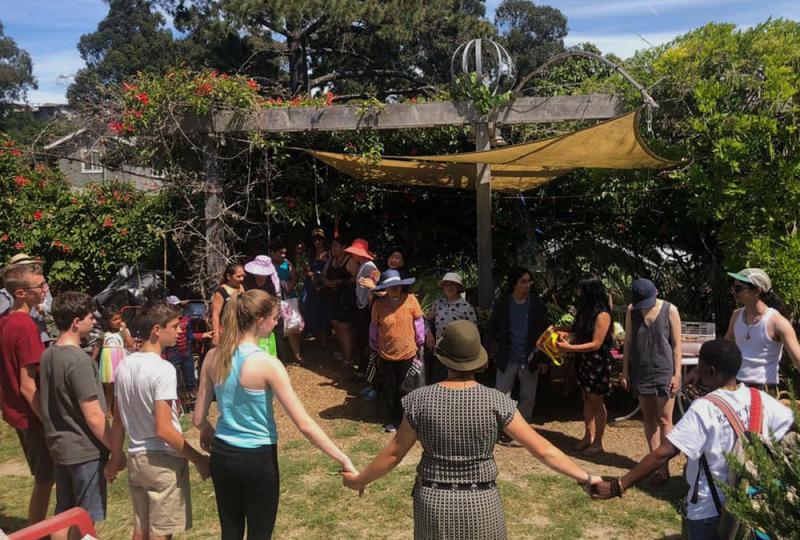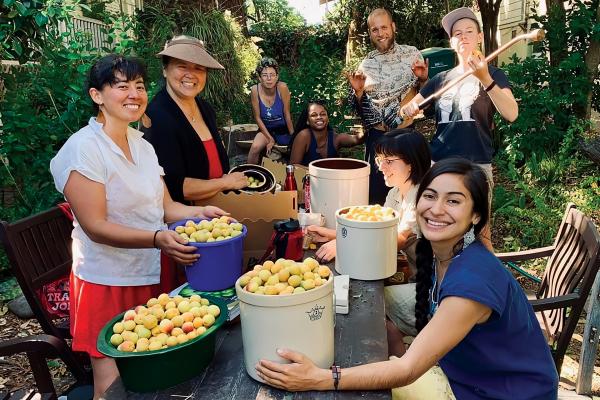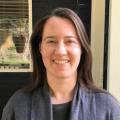WHEN I SPEAK on the phone with Anne Symens-Bucher, she tells me about the end of St. Francis of Assisi’s life. Francis “was losing sight, suffering from the pain of the stigmata, and on the margins of the community that had grown up to follow him,” Symens-Bucher explains. “This is the moment he writes the ‘Canticle of Creation.’” Symens-Bucher is one of the founders of Canticle Farm in Oakland, Calif., a community of eight households where the fences are taken down, giving access to a large garden in the middle. Canticle Farm is made up of people who, in Symens-Bucher’s words, are “experimenting at the intersections of faith-based, social justice-based, and Earth-based nonviolent activism.” In his canticle, after which this community is named, Francis praises God from a deep sense of kinship with all creation. He sings of “brother fire,” “sister water,” “brother wind,” “mother earth.” Birthed as Francis approaches his own death, it is a vivid, sober-minded song of the interconnectedness of all life.
Western colonialist people have often failed — or refused — to recognize this interconnectedness. Earth, animals, plants, and people suffer from our (and I say “our” because I speak as a white U.S. citizen) denial of this oneness. Soils are depleted, waters and air are poisoned, and sea levels rise and temperatures warm, threatening the most vulnerable among us immediately, and all of us eventually. Perhaps in this time of environmental crisis, we might find a “canticle” moment, one that renews our kinship with creation.
Liz Carlisle explores these questions in Healing Grounds: Climate, Justice, and the Deep Roots of Regenerative Farming. As an environmental scientist looking for healthy soil, Carlisle interviews experts who are Black, Indigenous, and people of color — scientists and farmers engaged in work ranging from bringing buffalo back to the prairie ecosystems of Montana to growing mushrooms on ancestral forest land in North Carolina. Through the process, she realizes that if we’re serious about fighting climate change by rebuilding soil carbon, we’re going to have to address the very roots of the colonialist systems in which we live.
How do soil depleters repent?
CARLISLE DOES NOT directly address the Christian faith tradition, but I wonder about the possibilities for connection. Are there ways Christianity could inspire a transformative vision similar to Carlisle’s — or is Christianity always and only the religion of the colonizers, the depleters of soils, the displacers of peoples? What does it look like to repent — to really repent, in a way that includes reparations — and learn to live in a different way? Are there healing grounds for Christianity?
The Bible is full of vivid images of land and people flourishing together. In the language of the psalms, seas lift up their voice (93:3) and all the trees of the forest sing (96:12). Earth is a gift from God, and all her beings return praise to God. Perhaps God is inviting Christians to think more deeply about the land beneath our feet — land that was not meant to be exploited and degraded but to rest and heal every seven years (Leviticus 25:1-7). Land that was not intended to be hoarded by a few but to be redistributed to every family once every generation (Leviticus 25:8-13). God blesses people by making “grass grow for cattle, and plants for people to cultivate” (Psalm 104:14) and by promising that “the trees will yield their fruit and the ground will yield its crops; the people will be secure in their land” (Ezekiel 34:27). This is also the vision of Carlisle and her interviewees: Land security. Abundance. Health and holistic well-being.
Perhaps the connection between right worship and abundant produce is not so metaphorical as those of us steeped in Western Christian traditions might imagine. We might read God’s promises of blessing and think, If we praise Jesus’ name, then God will supernaturally make our crops productive in answer to our prayers. This might happen. But what if, more often, the idea is that whole-bodied, whole-community worship builds and reinforces a sense of collective identity and connection to place? Maybe this care for Earth and for one another is where the blessings lie.
Perhaps right worship is less about saying the right things and more about learning to live in ways of interdependence. Ways that “see plants and animals as gifts, and indeed as teachers,” as Carlisle puts it, and that “let go of the idea of domination.” Ways that, as Jesus taught, consider the lilies and pay attention to the birds (Matthew 6:25-34). Ways that, as Aboriginal scholar Tyson Yunkaporta puts it in Sand Talk: How Indigenous Thinking Can Save the World, help us “start working with the land, rather than against it.” When we work with the land and with each other, as Yunkaporta continues, diverse communities can “share knowledge with one another while maintaining their own unique systems grounded in the diverse landscapes they care for.”
A vision of abundance
WE SEE THE devastation of colonialism in land and ecosystems, and we see it just as surely in human communities and relationships as well. Theologian Willie James Jennings reflects on this in After Whiteness: An Education in Belonging: “[T]he goal of the colonialist ... was to reduce the many to the one as a point of negotiation, management, conversion, and profit ... to move people slowly but clearly from any kind of group thinking about their wants and needs to thinking like an individual.” To restore the land, then, is to restore interconnectedness among humans. To refuse to reduce everything to profit. To choose to live in community rather than by a myth of independence.
canticlefarm.spota_.jpg

Symens-Bucher has seen this at Canticle Farm. As her community takes down fences between houses, they are finding new ways to exist together. They are living into the reality that, as Symens-Bucher says, “we are not separate from Earth.” They are cleansing the water in their well, which then flows back out into the broader Oakland community. As a diverse community — in age, race, class, and nationality — they are learning to heal trauma, to live in shared love and commitment. “Our security is in relationships,” Symens-Bucher tells me. “We invest in relationships and put our trust and security there.”
We live in a time of deep imbalance. As Indigenous ethnobotanist Stephanie Morningstar tells Carlisle in Healing Grounds, “climate change signals a profound imbalance ... rooted in the violent restructuring of relationships between people and land that lies at the very heart of this continent’s history.” Healing this imbalance will be difficult but not impossible. We can join God in rebuilding the kind of interconnected communities that colonialists sought to destroy. We can grow our own food in regenerative ways or support those who are. We can get involved in movements to restore land to Black people, Indigenous people, and people of color.
With visions of healing — like those of Healing Grounds and of Canticle Farm — and with faith the size of a mustard seed (Luke 17:6), we can collectively uproot the exploitative colonialist systems that keep us all from the abundant life Jesus promised. We can build something better in their place.

Got something to say about what you're reading? We value your feedback!







